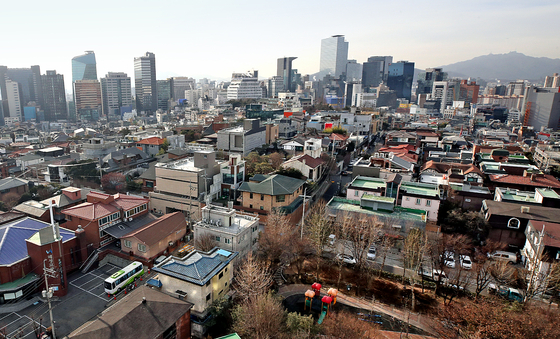
The government plans to supply 460,000 housing units and 310,000 apartment units next year. The photo shows a residential area in Gangnam-gu. yunhap news.
The government said it would supply 460,000 housing units next year. It is interpreted that this is due to the fact that the rent of houses in Seoul has risen again after the enactment of the 2nd Lease Act. It is trying to stabilize market sentiment by sending a signal to the housing market that there is enough supply.
Deputy Prime Minister Hong Nam-ki and Minister of Strategy and Finance said at a meeting of ministers related to the real estate market inspection on the 22nd, “The basic premise of stabilizing the housing market is sufficient supply.” Will supply.”
The plan to supply 460,000 units is based on the number of occupied units, with 278,000 units in the metropolitan area and 83,000 units in Seoul. Out of 460,000 apartments, 319,000 apartments, 188,000 in the metropolitan area, and 41,000 in Seoul.

The government’s housing supply plan for next year. Graphic = Reporter Kim Kyung-jin [email protected]
In order to soothe market anxiety, the government focused on the number of 460,000 units, but it is difficult to interpret it as just rosy. Deputy Prime Minister Hong said, “The amount of occupancy exceeding the average level will be supplied to help stabilize the market.” The average level in the average of 10 years (2010-19) is 457,000 units.
However, if the period is narrowed, the supply volume turns into a decrease. In the past three years (2017-19), an annual average of 571,000 units has been supplied nationwide. Compared to this figure, next year’s supply will decrease by more than 110,000 units. There is also an imaginary number here. This is because the government added the number of 36,000 units, which was rapidly increased last month through hotel remodeling to solve the burning jeonse crisis.
The proportion of apartments that are driven by market demand among the total volume is decreasing. The number of apartments occupied next year (319,000 units) accounts for 69% of the total. The rest is that it will be supplied as row houses, multi-family houses, and multi-family houses. This year’s apartment supply ratio (78%) is expected to decrease by 9%. In particular, in Seoul, where construction of large complexes has stopped due to regulations on reconstruction and redevelopment, the supply of apartments is significantly decreasing. Of the total supply of 83,000 units in Seoul next year, only half of the apartments (41,000 units) are expected.
The difference between the government’s optimism and the market temperature is huge. In private real estate information companies, there are voices of concern about the decline in occupancy next year. It is a stark difference from the government’s position that there is enough supply. For Real Estate 114, the number of occupied apartments in Seoul next year will be 28,855 units, which is expected to decrease by more than 40% from this year (48,860). Jihae Yoon, researcher at Real Estate 114, said, “As the number of occupants is decreasing within a year or two, it may be difficult to resolve the short-term jeonse crisis.”
The number of real estate 114 is more than 10,000 units less than the government’s estimate (41,000 units). The Ministry of Land, Infrastructure and Transport explained, “The private sector counts the volume of the tenant recruitment announcement, and does not include public leases without a pre-sale plan, and post-sale quantities.” A real estate expert who requested anonymity said, “The private sector’s volume can be more meaningful than the government’s plan to increase the number by adding various public leases such as youth housing.”
Many experts in the real estate market predict that the government’s supply plan will not be effective. Dae-Jung Kwon, a professor at the Graduate School of Real Estate at Myongji University, said, “It is difficult to satisfy consumers who prefer apartments by increasing the number of renovated villas and hotels or public rental housing.
Chung-Hyung Lee, professor of urban design at Chung-Ang University, also said, “The house price will stabilize only when the private-centered supply is made by partially easing reconstruction and redevelopment regulations.”
Reporter Yeom Ji-hyun [email protected]
